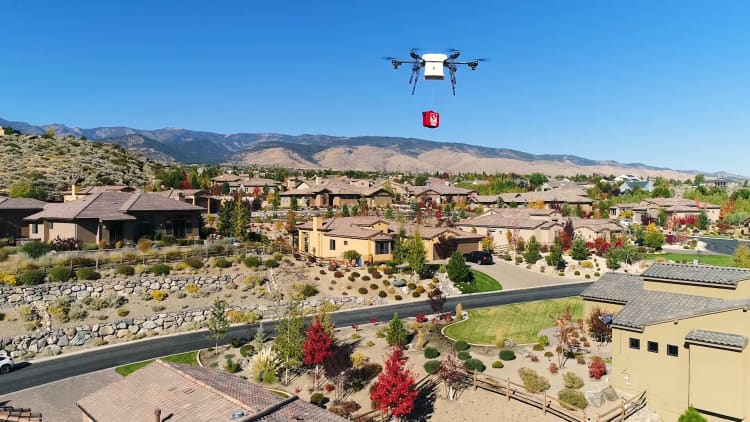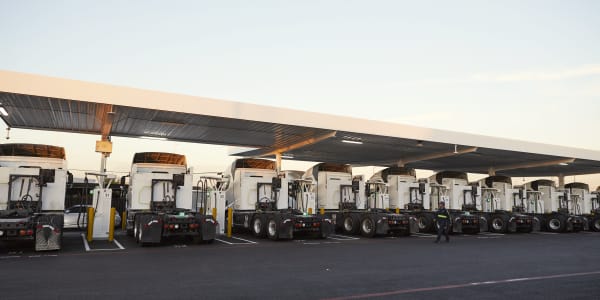Blood-bearing drones zipping through the sky sounds something like a scene from apocalyptic science fiction. But for doctors in Rwanda, it's the default method of lifesaving medical-supply delivery.
That's because of drone start-up Zipline International, a delivery and logistics company that launched in 2016 and operates the only autonomous drone system for delivering blood to remote hospitals in the African country.
Blood is "expensive, lifesaving but doesn't last very long," Zipline co-founder and CEO Keller Rinaudo said. "So traditional supply chains do a very poor job of distributing it. Using drones, we can deliver blood 10 times as quickly as cars, on demand."
Zipline has completed 300,000 km of autonomous flight across Rwanda — a nation known for its mountainous geography, difficult weather and poor infrastructure — delivering 7,000 units of blood over 5,000 flights.
A doctor in Rwanda with a patient in need and too little blood on hand can send a text to Zipline with the blood type and number of units needed. The blood is loaded into a box with a parachute and onto an autonomous plane — which drops the package at the designated hospital in 30 minutes or less.
Zipline doesn't disclose operational costs but said the cost to deliver by drone is on par with traditional methods of delivery, like car or motorcycle.
It can already reach more than 10 million people in Rwanda, and it's rapidly expanding.
"By virtue of being the only company doing this, we're also learning faster," said Rinaudo, whose vision is to lead the logistics industry into an instant, automated drone-delivery future. "Everything about the service we provide is improving on a monthly basis."
"It's very easy to do a demonstration flight over a few kilometers in perfect weather once, but very hard to run a fully automated system operating at national scale, capable of doing hundreds of flights a day in any weather, that people can rely on with their lives," Rinaudo said.
Racing ahead of tech giants in drone-flying
That experience puts Zipline well ahead of some of the largest tech companies in the world that are also exploring drone technology. It also earned it the No. 25 spot on the 2018 CNBC Disruptor 50 list.
"The key competitive advantage Zipline has is the real production-scale experience with the parcel delivery. And whether the parcel contains blood or any other more (iPhone) or less (book) fragile product, from the technological and operational perspective it does not matter so much," said Michael Mazur, partner in PwC's Drone Powered Solutions practice, which estimates the size of the potential drone market at $127 billion.
Mazur said the number of drone flights that Zipline conducts daily is likely more than all of the registered flights in the history of Amazon and Google's proof-of-concept efforts.
Zipline has already increased its distribution center daily capacity from 50 to as high as 500 drone flights out of its first base in western Rwanda. It's also preparing to launch a second flight base in the coming months in the eastern half of the Central African country. That goal is tied to its recent launch of the world's fastest commercial drone, with a top speed of 128 km/h and a cruising speed of more than 101 km/h.
"I don't think there are any U.S. or European companies that run as many flights as them," said Timothy Reuter, who heads the World Economic Forum's San Francisco-based drones project.
Amazon has been experimenting with drone delivery for a small group of customers in Cambridge, England, where it also has a drone research lab. Alphabet's Google has started drone tests in Australia, but the experts say these efforts are nowhere near as evolved as Zipline's effort.
"They didn't have the luxury of waiting around for years to launch their product and generate revenue," Reuter said.
Zipline has been designing and building "from scratch" the relevant technology — from flight computers, to the aircraft themselves, to the software to keep them on track — for five years, Rinaudo said.
The company recently redesigned its aircraft and autonomous systems to allow the planes to fly further with heavier cargo on board. The firm already has increased its delivery capacity 10-fold and has plans to launch in new countries "on a pretty consistent basis" starting later this year.
Designing the technology is the easy part, according to the company — it's integrating with national health systems that poses a challenge.
Drone experts say, in fact, that Zipline's biggest advantage may not be in the drone itself but in the logistics knowledge that it's amassing.
Reuter said Zipline is communicating with blood banks, health systems and clinics and learning how to most effectively communicate with clients. "It's difficult to do that at scale," he said. "The hard part of drone delivery is not making a drone that can carry something. It's building a service that can run every day, making thousands of deliveries in a reliable manner, and do so in an economically sustainable way," said Reuter, who has been to Zipline's first distribution center in Rwanda. "We believe Rwanda can serve as a model for the rest of the world in how to enable drone delivery."
A goal of making all logistics instant and automated
Zipline currently delivers blood only to hospitals in Rwanda, but it has much bigger plans. Zipline will start delivering vaccines, other medications and general medical supplies in the coming months.
"In the long run, we think that all logistics will be instant and automated," Rinaudo said. "In the same way that the internet made moving information around the world very fast and very low cost, robotics can transform the way that we move around products."
That carries implications for "the billions of people on the planet today who are largely cut off from global markets and e-commerce," he said.
The firm has raised more than $114 million to date, according to PitchBook, from major backers like Sequoia Capital, Andreessen Horowitz and Visionnaire Ventures. It's currently valued at over $500 million.
As Zipline continues to expand, and as companies like Amazon push communities' comfort level with drones, venture investor and Zipline board member Susan Choe said she expects Zipline to enter into large-scale global partnerships.
"I saw Zipline as a globally impacting — and now we're often hearing socially impacting — type of a play, backed up by a world-class tech team," said Choe, who was a co-founder of VC firm Visionnaire Ventures and recently founded Katalyst Ventures to focus on impact investing.
"Instant delivery will enable us to achieve 100 percent access to health care for every human on the planet," Rinaudo said. "It's not a complicated idea, and it's something that every family wants, no matter where you live."
Zipline's logistics model could eventually make the leap from rural health care to the internet retail or freight sector, but that isn't critical to its success.
"[Zipline] can perform 50 flights a day without a crash and on time, with a package untouched," PwC partner Mazur said. The number of drone flights it is able to successfully pilot on a daily basis already leads one to think of the opportunity in what's called "the last mile" of delivery: parcels sent by internet retailers and freight companies within metro areas of large cities. Mazur added, "That's why it is so interesting to think not only about how much this company can earn from health care but other sectors that can be promising."
To date, Zipline's model in Rwanda is medium- to long-term flights, which might be most easily extended to oil rig and industrial site deliveries. Other drone start-ups have focused specifically on the urban delivery market, such as Menlo Park, California-based Matternet, which is currently delivering blood samples at hospitals over densely populated streets in Lugano, Switzerland.
If these start-ups will prove that their technology and solution operates equally well in the U.S., for sure they will become interesting acquisition targets.Michal MazurPwC partner
There is plenty of money to be made in health care. "Lifesaving medical delivery is a legitimate business in and of itself," Reuter said. "African governments are already spending billions on medical-supply chains, so if [Zipline] can lower cost and improve service, its not a philanthropic endeavor but a real business, and they are gaining experience running a real logistics operation."
Colin Snow, an analyst at Skylogic Research, said he doesn't believe Zipline's drones, which require a fixed platform and plenty of room for launch, would ever work for a company like Amazon's delivery needs — namely, vertical launch to accommodate urban areas.
"It's a bigger operation than is required. ... It's sort of old-school," Snow said. "You need to have a launching device, and launching devices are not portable."
Navigating the US skies for the first time
The reason Zipline has raced ahead in Rwanda is because the government has been more flexible than many other regulatory regimes around the world. That's also why Google is piloting drones in Australia and Amazon is working in the U.K. But the United States is finally taking steps to allow drone business models to experiment and develop on a local level around the country.
Earlier this month, the Federal Aviation Administration approved the first-ever pilot programs for drone flights and, more important, flights that are allowed to go beyond an operator's "line of sight," which is critical to developing commercially viable drone businesses.
Zipline is part of one of the proposals that won a coveted green light in the nationwide contest launched by the Trump administration. Another 2018 CNBC Disruptor 50 company, Flirtey, was also included in winning proposals, including one in Reno, Nevada, to deliver defibrillators. Amazon, though it submitted proposals, was shut out. Google's Project Wing will be part of a drone-delivery pilot program to be conducted in Virginia.

Zipline is part of North Carolina's winning transportation department proposal, which intends to bring a similar medical-supply delivery system to the state, with delivery bases like Zipline has in Rwanda. North Carolina has a large rural population, as high as 40 percent, and these communities have more difficulty accessing health care. Matternet is also among the drone companies working with Zipline on this project.
Reuter at the WEC said that Zipline, Flirtey and Matternet are "the big three" in terms of the start-ups really pushing the drone business model forward, but getting regulations right are critical to giving drone companies a chance to develop a viable business model. "Medical delivery is easier to convince governments to be flexible about and accept risk, because they understand the technology is saving lives rather than just a method of convenience," Reuter said.
He thinks the drone market isn't going to go the way of most tech niches, where the giants devour the start-ups and it quickly becomes "a winner-take-all industry."
"Amazon and Google are committed to launching services around drone delivery, but that doesn't mean we will see huge consolidation of this market. ... The economics of logistics aren't the same as the economics of computational technology. Logistics is an easy space to enter but a hard space to make money, so learning how to be operationally efficient is the key to long-term sustainability."
Snow doesn't think Zipline would be the right play for an internet retailer like Amazon, anyway. He said it's "quite possible" that Zipline could be a takeout candidate for a larger company, but it would be for their medical expertise, not their drones.
Zipline's vertically integrated model makes it a more defensible business than many start-ups at which venture capitalists throw money, but its logistics expertise will keep it on the radar of larger companies.
"Internet retailers want to keep that last-mile delivery cost as low as possible," Mazur said. It's not yet proved that the drone start-ups will be cheaper, but if lots of autonomous, inexpensive drones are allowed by regulators to be flown by computers rather than individual pilots, the market opportunities may develop rapidly. "If these start-ups will prove that their technology and solution operates equally well in the U.S., for sure they will become interesting acquisition targets," Mazur said.
— Additional reporting by CNBC.com editor Eric Rosenbaum








